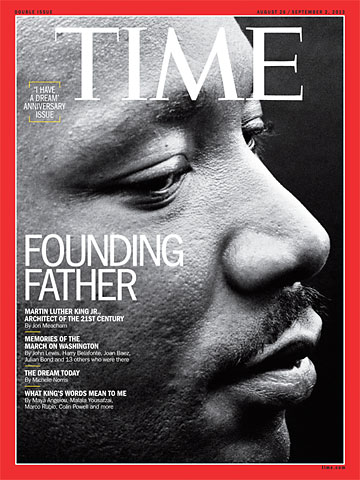
(3 of 6)
It is tempting to romanticize the words King spoke before the Lincoln Memorial. To do so, however, cheapens the courage of the known and the unknown nonviolent soldiers of freedom who faced--and often paid--the ultimate price for daring America to live up to the implications of the Declaration of Independence and become a country in which liberty was innate and universal, not particular to station, creed or color. The true honor we can give to King and his comrades is not to render them as fantastical figures in a Manichaean struggle but to see them as human beings who summoned the will to make the rest of us be the people we ought to be.
The death of Jim Crow is an epic story, but it is no fairy tale, for the half-century since the March on Washington has surely taught us that while African Americans are largely living happier lives, no one can sensibly say that everyone is living happily ever after. The dream of which King spoke was less a dream to bring about on this side of paradise than a prophetic vision to be approximated, for King's understanding of equality and brotherhood was much likelier to be realized in the kingdom of God than in any mortal realm. In Washington to demand legislative action, King spoke as a minister of the Lord, invoking the meaning of the Sermon on the Mount in a city more often interested in the mechanics of the Senate.
However unreachable King's dream seems to be on this side of paradise, though, we must try. Like the promises of the Declaration of Independence or the Gettysburg Address or FDR's First Inaugural ("The only thing we have to fear is fear itself"), the promises of King's "I Have a Dream" sermon can be kept only if the nation is mindful of what Lincoln called "the better angels of our nature." In his words to the March on Washington, Martin Luther King Jr. gave us a standard against which we could forever measure ourselves and our nation. So long as his dream proves elusive, then our union remains imperfect.
A WEDNESDAY IN WASHINGTON
White Washington had expected mayhem. Few bureaucrats or lawyers who worked downtown in the capital showed up for work on Wednesday, Aug. 28, 1963. That many blacks? In one place? Who knew what might happen? Even the ordinarily liberal New York Times was wary. "There was great fear there would be rioting," recalled the Times' Russell Baker, who was assigned a front-page feature on the march, "so the Times chartered a chopper." Boarding the helicopter early in the day, Baker grew so bored by the peaceable spectacle that he asked the pilot to fly over his house so he could check on the condition of his roof. "Finally," said Baker, "I had him land at National Airport and went to the Lincoln Memorial."
